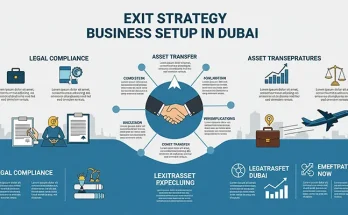Key Takeaways:
- Auditing requirements for a Business setup in Dubai vary significantly between mainland and free zone companies.
- Mainland companies (LLCs, PJSCs) are generally required to undergo annual statutory audits as per UAE Commercial Companies Law.
- Many free zones (including Meydan Free Zone in Dubai) also mandate annual audits, especially for license renewal.
- The introduction of Corporate Tax has made audited financial statements mandatory for “Qualifying Free Zone Persons” and taxable persons with annual revenues exceeding AED 50 million.
- Audits ensure financial transparency, regulatory compliance (including IFRS), and enhance business credibility.
Dubai’s vibrant economy and proactive approach to international business standards mean that establishing a Business setup in Dubai comes with specific regulatory expectations, particularly concerning financial transparency. Auditing plays a crucial role in this framework, ensuring that companies operate compliantly and maintain accurate financial records. While the extent of mandatory auditing can depend on various factors, understanding these requirements from the outset is essential for any entrepreneur.
Mandatory Auditing for Mainland Companies and Specific Entities for Business setup in Dubai
For businesses choosing a mainland Business setup in Dubai, annual auditing is a fundamental and often mandatory requirement, stipulated by federal law.
- UAE Commercial Companies Law: Federal Law No. 32 of 2021 on Commercial Companies generally mandates annual statutory audits for most types of mainland companies, including Limited Liability Companies (LLCs), Public Joint Stock Companies (PJSCs), and Private Joint Stock Companies (PrJSCs). The law requires these companies to maintain proper books of accounts and appoint one or more auditors to audit their financial statements yearly.
- Purpose of Statutory Audits: These audits serve to verify the accuracy and fairness of a company’s financial statements (balance sheet, income statement, cash flow statement). They ensure that the financial records comply with International Financial Reporting Standards (IFRS), which are widely adopted in the UAE. The audited statements provide transparency to shareholders, investors, and regulatory bodies.
- Submission Requirements: While mainland companies are required to conduct these audits, the submission of the audit report to government authorities is not always universally mandated for all types or sizes of mainland companies. However, audited financial statements are often required for:
- Trade License Renewal: In many cases, the Department of Economy and Tourism (DET) may request audited financial statements as part of the trade license renewal process.
- Corporate Bank Account Maintenance: Banks frequently ask for audited financials to maintain corporate accounts or for lending purposes.
- Liquidation: Companies undergoing liquidation must have the liquidator produce an audit report.
- Consequences of Non-Compliance: Failure to conduct mandatory audits or submit required reports can lead to fines, penalties, and even difficulties in renewing trade licenses or obtaining government approvals.
Therefore, for a Business setup in Dubai on the mainland, factoring in regular audits is not just good practice, but a legal obligation.
Auditing Requirements in Free Zones for Business setup in Dubai
The auditing requirements for a Business setup in Dubai within a free zone can vary, but most major free zones now mandate annual audits.
- Varying Regulations: Each of Dubai’s numerous free zones operates under its own set of regulations. While historically some smaller free zones offered exemptions for certain business types or sizes, the trend is towards increased transparency and compliance. Many prominent free zones now explicitly require annual audits for all registered companies.
- Mandatory in Major Free Zones: Free Zones like Dubai Multi Commodities Centre (DMCC), Jebel Ali Free Zone (JAFZA), Dubai Airport Freezone (DAFZA), Dubai International Financial Centre (DIFC), and Dubai Silicon Oasis (DSO) all have mandatory annual audit requirements. Companies in these zones must submit audited financial statements for trade license renewal.
- Submission Deadlines: Free zone authorities typically set specific deadlines for submitting audited financial reports. For example, many free zones, including Meydan Free Zone in Dubai, require submission within 90 days from the end of the financial year.
- Approved Auditors: Free zone authorities often maintain a list of approved auditors or require that audits be conducted by a firm licensed by the Ministry of Economy in the UAE. Businesses must engage one of these approved audit firms to ensure their reports are recognized and accepted.
- Benefits in Free Zones: Even where not strictly mandatory for all entities, undergoing an audit can:
- Enhance Credibility: Build trust with banks, potential investors, and suppliers.
- Improve Internal Controls: Identify weaknesses in financial processes.
- Aid in Compliance: Support adherence to other regulations like Economic Substance Regulations (ESR – though reporting requirements for these have been integrated into Corporate Tax) and Anti-Money Laundering (AML).
Therefore, any Business setup in Dubai within a free zone should anticipate and budget for annual audit requirements.
Impact of Corporate Tax on Auditing for Business setup in Dubai
The introduction of Corporate Tax in the UAE has significantly expanded the scope and necessity of auditing for many businesses, irrespective of their jurisdiction.
- Mandatory Audits for Corporate Tax Purposes: As per Ministerial Decision No. 82 of 2023, certain taxable persons are required to prepare and maintain audited financial statements for Corporate Tax purposes. This includes:
- Qualifying Free Zone Persons: All Qualifying Free Zone Persons (QFZPs), regardless of their revenue, must prepare audited financial statements to maintain their eligibility for the 0% Corporate Tax rate on qualifying income. This is a critical requirement for free zone companies to avail themselves of tax incentives.
- Taxable Persons Exceeding Revenue Threshold: Any other taxable person (including mainland companies) whose annual revenue exceeds AED 50 million during a relevant tax period is also required to submit audited financial statements.
- Tax Audits by the FTA: The Federal Tax Authority (FTA) may conduct tax audits (both VAT and Corporate Tax audits) to verify compliance with tax laws. While these are separate from statutory financial audits, having well-prepared and audited financial statements significantly aids in the smooth conduct of a tax audit. Businesses must maintain proper records for at least 7 years for potential FTA audits.
- Importance of IFRS: For Corporate Tax compliance, audited financial statements must be prepared in accordance with International Financial Reporting Standards (IFRS) by a licensed auditor. This ensures consistency and comparability of financial data.
- Consequences of Non-Compliance: Failure to comply with Corporate Tax audit requirements can lead to substantial fines and penalties from the FTA, impacting the financial health and legal standing of your Business setup in Dubai.
The Corporate Tax regime has underscored the importance of robust accounting practices and, for many, made annual audits an undeniable necessity for their Business setup in Dubai.
Choosing an Approved Auditor and Audit Benefits for Business setup in Dubai
Selecting the right audit firm is a critical decision for any Business setup in Dubai, ensuring compliance and gaining valuable financial insights.
- Requirements for Auditors: In the UAE, only auditors licensed by the Ministry of Economy and, in many cases, approved by specific Free Zone authorities, can conduct audits. These auditors must adhere to International Standards on Auditing (ISA) and International Financial Reporting Standards (IFRS).
- Factors When Choosing an Audit Firm:
- Licensing and Approvals: Ensure the firm is properly licensed by the Ministry of Economy and, if operating in a free zone, is on the approved list of that free zone (e.g., Meydan Free Zone in Dubai maintains such a list).
- Experience and Expertise: Opt for firms with a strong track record and experience in your industry sector and with UAE regulations.
- Reputation and Credibility: Look for firms with good client testimonials and a solid reputation for integrity and professionalism.
- Service Scope: Consider whether they offer additional services like tax advisory (VAT, Corporate Tax), bookkeeping, and financial consulting, which can provide integrated support.
- Transparency in Fees: Get a clear, upfront quotation of all costs involved.
- Benefits of a Timely Audit: Beyond regulatory compliance, audits offer several advantages for your Business setup in Dubai:
- Enhanced Financial Control: Provides an objective assessment of your financial health, identifying strengths and weaknesses in your financial systems.
- Improved Credibility: Increases trust among stakeholders, including banks, investors, and suppliers, making it easier to secure funding or form partnerships.
- Risk Mitigation: Helps identify and mitigate financial risks, fraud, and errors.
- Informed Decision-Making: Provides reliable financial data for strategic planning and operational decisions.
- Support for Business Expansion: Facilitates due diligence for mergers, acquisitions, or seeking external investment.
Engaging a professional and approved audit firm is an investment that contributes significantly to the stability and growth of your Business setup in Dubai.
How Can Meydan Free Zone Help?
For businesses considering What about auditing business setup in Dubai?, Meydan Free Zone in Dubai simplifies compliance by clearly outlining and supporting the audit requirements for companies within its jurisdiction. Meydan Free Zone in Dubai explicitly mandates annual audits for companies registered there. They require audited financial statements to be submitted within 90 days from the end of the financial year.
Meydan Free Zone in Dubai maintains a list of approved auditors, ensuring that businesses can easily find a qualified and recognized firm to conduct their annual audits. This direct approach helps businesses comply with both free zone regulations and the broader UAE Corporate Tax requirements, particularly for maintaining eligibility for the 0% corporate tax rate as a Qualifying Free Zone Person. By providing clear guidelines and a network of approved professionals, Meydan Free Zone in Dubai makes the auditing process for your Business setup in Dubai straightforward and compliant.



